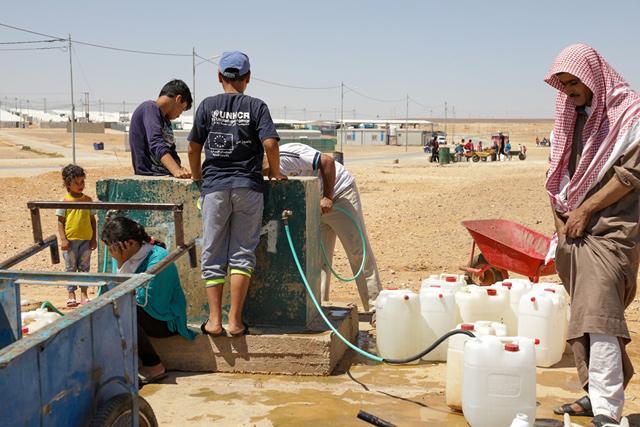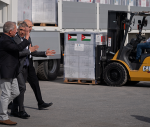You are here
UNHCR calls for support as only 24% of its operations in Jordan funded for 2019
By Elizabeth Turnbull - Jul 25,2019 - Last updated at Jul 25,2019

Syrian refugees are seen at the Zaatari refugee camp, home to around 80,000 displaced Syrians, in Mafraq Governorate, some 80km north of Amman (JT file photo)
AMMAN — The UNHCR has called on the international community to show more solidarity with Jordan and the refugee agency in meeting the needs of 1.3 million Syrian refugees, noting that its operations in the Kingdom for 2019 are only 24 per cent funded so far.
"With new competing priorities globally, we are concerned that the financial support for Syrian refugees will continue to diminish," UNHCR spokesperson Lilly Carlisle told The Jordan Times on Tuesday.
While Carlisle expressed gratitude for the funding that has already been received, she added: “As of July, UNHCR Jordan’s operation is only 24 per cent funded for 2019. We are thankful for the funding received so far but the reality is that funding is not keeping up with the needs of refugees.”
“As for our non-Syrian funding appeal, we are only 17 per cent funded for 2019,” she said. In 2018, 90 per cent of Syrian households living in host communities resorted to livelihood-based coping strategies in order to continue obtaining food and other basic needs with over half of households resorting to reducing essential non-food expenditures, according to a report by the World Food Programme (WFP) and the humanitarian initiative REACH.
Food assistance programmes have remained essential in order for Syrian refugees to obtain adequate food, with at least one member of 95 per cent of Syrian households receiving WFP food assistance, according to the report.
As costs for obtaining healthcare have increased from being free for Syrian refugees in 2014 to 80 per cent of the costs for non-Jordanians as of February 2018, more Syrian households are inadequately treating health issues, the report said.
Sixty-four per cent of registered Syrian refugee households in host communities reported shelter as their main unmet need, 38 per cent of them were forced to change accommodations primarily due to being evicted by their landlords or having to put less money towards rent, according to the report.
Work opportunities for Syrian refugees in host communities are often temporary or informal. Only 13 per cent of Syrian working men and women have regular jobs and 33 per cent have work permits, according to the report.
Refugees in Azraq and Zaatari refugee camps have more stable access to shelter, education, health and WFP food assistance, the report said, with acceptable levels of food consumption rising from 78 per cent of households to 96 per cent in 2018, although food prices in camps have increased.
Recommendations for improving the lives of Syrian refugees included in the report suggest there should be increased efforts to formalise work for refugees, more access to rental assistance, and a strategic identification of the key characteristics of those who are most food insecure and vulnerable, among other things.
Related Articles
AMMAN — The UNHCR currently has no plans to reduce the amount of cash assistance it provides to Syrian refugees in Jordan despite a decrease
AMMAN — UNHCR-Jordan voiced its concern on Monday as it had only secured 6 per cent of its $371.8-million operating budget for 2019.“For the
Approximately 56 per cent of Syrian refugee households in Jordan are food secure, according to a report released Wednesday.
















